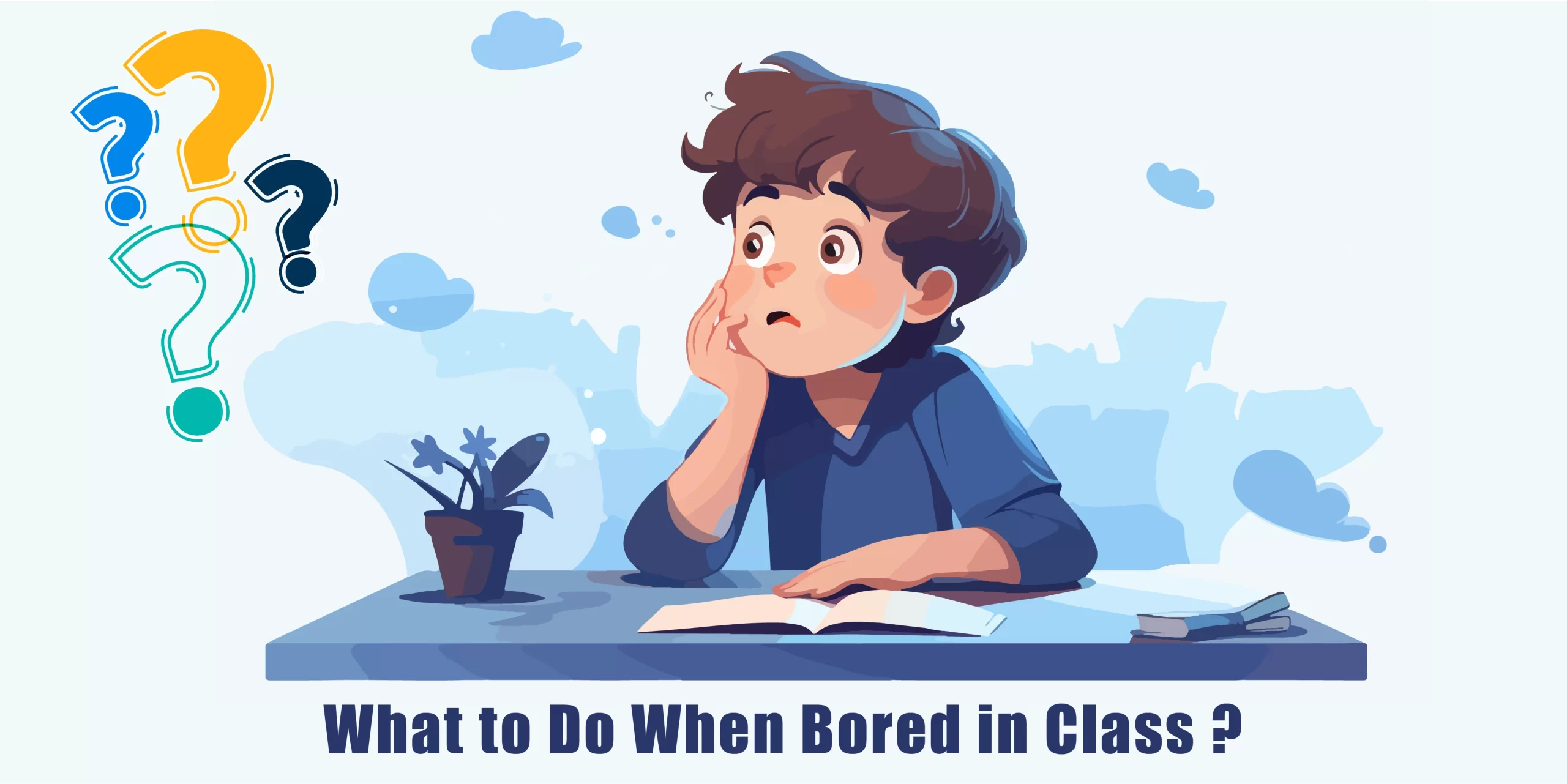We’ve all been there—sitting in a classroom, feeling like time is crawling by, and wondering what to do when bored in class. It’s a common experience that can happen to anyone and is a normal part of the learning process. But boredom doesn’t have to derail your education. In fact, those moments of inattention can be transformed into opportunities for productivity and even fun. Class boredom can negatively affect your ability to concentrate and retain information, making it harder to stay engaged with the material. This article will explore a variety of engaging activities and strategies to keep you occupied and make the most out of your classroom time. From creative endeavors to mental challenges, and digital solutions, we’ve got you covered with plenty of options to turn your boredom into productivity. So, next time you find yourself zoning out, try some of these tips to make your time in class more enjoyable and useful.
Creative Activities to Combat Classroom Boredom
Doodle Your Way to Focus:
When thinking about things to draw when bored in class, consider how doodling can help improve your concentration and spark creativity. Drawing abstract patterns, sketching your favorite characters, or even designing intricate landscapes can keep your hands busy and your mind engaged, making the lecture more bearable. Not only does doodling help pass the time, but it also stimulates brain activity, allowing you to process information more effectively. Studies have shown that doodling can improve focus and memory retention, so next time you’re feeling restless, grab a pen and start drawing.
Write a Short Story or Poem:
If you’re looking for things to do when bored in class, why not unleash your inner writer by crafting a short story or a poem? Use your imagination to transport yourself to different worlds or to articulate your thoughts and feelings. Creative writing not only provides mental stimulation but also serves as a stress reliever. It’s a productive way to channel your boredom into something tangible and rewarding. Writing creatively can enhance your language skills, expand your vocabulary, and improve your ability to express yourself. Plus, it’s a fun and therapeutic way to let your creativity flow.
Create Mind Maps:
Creating mind maps is another excellent option when you’re seeking things to do when bored in class. Start with a central idea and branch out into related topics, creating a web of interconnected concepts. This method helps you see the bigger picture and retain information better. Plus, it’s a dynamic and engaging way to interact with the material being taught. Mind mapping encourages critical thinking and helps you organize your thoughts visually, making it easier to understand complex subjects. It’s a powerful tool for brainstorming, planning, and studying, and can transform a dull lecture into an interactive learning experience.
Mental Challenges for Brain Stimulation
Solve Puzzles Like Sudoku or Crosswords:
If you’re ever stuck thinking about things to do in class when bored, consider solving puzzles like Sudoku or crosswords. These activities are quiet, portable, and can significantly boost your cognitive functions. Puzzles stimulate your brain, improve your problem-solving skills, and provide a sense of accomplishment each time you solve one. Engaging in puzzles helps enhance your logical thinking, concentration, and memory. They’re perfect for keeping your mind sharp and focused, making the time in class fly by. Plus, they’re discreet enough to do without distracting your classmates or drawing attention to yourself.
Memorize Something New:
Wondering what to do when you’re in class bored? Turn your idle time into a memory exercise. Memorize a poem, historical facts, vocabulary words, or even elements from the periodic table. This practice not only enhances your memory but also keeps your mind active and engaged. It’s a productive way to use your time when you find yourself bored in class. Memorization exercises can improve your recall abilities and help you retain information more effectively. They’re a great way to keep your brain engaged and make the most of your time in a boring lecture.
Practice Mental Math or Logic Games:
For those pondering things to do in class when bored, mental math exercises and logic games are great for keeping your brain sharp. Practice simple calculations or solve logic puzzles like riddles and brainteasers. These activities are discreet and can be done without any materials, making them perfect for keeping boredom at bay during lectures. Mental math and logic games enhance your analytical thinking and problem-solving skills. They’re an excellent way to challenge yourself and keep your mind engaged, making even the most tedious class time productive.
Productive Classroom Activities
Take Detailed Notes:
When you’re considering what to do when bored in class, channel your focus into taking detailed notes. Summarize the lecture in your own words, highlight key points, and create diagrams to illustrate complex ideas. Detailed note-taking not only keeps you engaged but also makes studying for exams much easier. Taking effective notes helps you retain information, understand the material better, and provide a valuable resource for review. Use different techniques like bullet points, mind maps, and color-coding to make your notes more organized and visually appealing. Engaging with the lecture material in this way can transform a boring class into an interactive learning session.
Ask Questions and Participate:
Another great idea for what to do when you’re bored in class is to engage with the lecture material by asking questions and participating in discussions. This not only helps you understand the content better but also makes the class more interesting. Don’t be afraid to speak up; chances are, your classmates have the same questions. Active participation can lead to a deeper understanding of the subject and keep you involved in the learning process. Engaging in class discussions helps develop your critical thinking and communication skills, making the learning experience more dynamic and enjoyable.
Plan and Organize Your Week:
If you’re searching for things to do when bored in class, use this time to plan out your week. Create a to-do list of assignments, projects, and study sessions. Organizing your tasks can help reduce stress and ensure you don’t forget any important deadlines. Effective planning and organization can improve your time management skills and help you stay on top of your workload. Use tools like planners, calendars, and apps to keep track of your tasks and stay organized. Taking the time to plan and organize can make your week more manageable and productive.
Organize Your Notes and Assignments:
When you’re stuck wondering what to do when bored in class, take a few minutes to organize your notes and assignments. Create a system that works for you, whether it’s color-coding your notes or using different folders for each subject. A little organization goes a long way in making your study time more efficient. Keeping your notes and assignments organized helps you stay focused and reduces the time spent looking for materials. It also makes it easier to review and study, ensuring that you’re prepared for exams and assignments. Developing good organizational habits can enhance your academic performance and reduce stress.
Digital Solutions for Boredom
Educational Websites and Apps:
When considering things to do on a computer when bored, there are countless educational websites and apps that can help you stay engaged and productive. Whether it’s Khan Academy for math and science or Duolingo for language learning, there’s something for everyone. Use these resources to supplement your learning and make the most of your classroom time. Educational websites and apps provide interactive and engaging content that can enhance your understanding of various subjects. They offer a wide range of courses, tutorials, and exercises that cater to different learning styles and interests.
Research Interesting Topics:
If the lecture topic isn’t grabbing your attention, use the time to research something that does interest you. Wondering what to do when bored with a computer? Maybe you’re fascinated by black holes or want to learn more about ancient civilizations. Doing a little independent research can make the class feel more relevant and engaging. Exploring topics of personal interest can ignite your curiosity and expand your knowledge. Use reliable sources and academic databases to find information and dive deeper into subjects that captivate you. Independent research fosters self-directed learning and can make even the dullest class more exciting.
Watch Educational Videos or TED Talks:
When you’re thinking about what to do when bored in class on computer, consider watching educational videos or TED Talks related to class subjects. Visual learning can be incredibly effective, making complex topics more understandable and engaging. Educational videos and TED Talks offer concise and informative presentations on a wide range of topics. They can provide new insights, perspectives, and inspiration, making the learning process more dynamic. Use platforms like YouTube and TED to find content that aligns with your interests and complements your studies.
Listen to Podcasts or Audiobooks:
Looking for fun things to do on a computer when bored? Listening to educational podcasts or audiobooks can be a discreet way to learn new information and stay engaged during class. Find a podcast related to your class subject or an audiobook on a topic you’re passionate about. Podcasts and audiobooks are convenient and flexible learning tools that you can listen to anytime, anywhere. They offer a wealth of knowledge and can enhance your understanding of various subjects. Use platforms like Spotify, Audible, and Apple Podcasts to discover content that interests you and keeps you engaged.
Seeking Help and Support
Online Class Help Services:
Sometimes, classes can be challenging, and you might need a little extra help. Websites that offer take my online class for me services can be a lifesaver. They provide online class help and ensure you stay on track. However, it’s important to use these services responsibly and as a supplement to your learning, not a replacement. Hiring someone to take your online class can help you manage your workload and improve your understanding of difficult subjects. Make sure to choose reputable services and use them to enhance your learn what do you do when you are broadening experience.
Form Study Groups:
Another effective strategy when considering what to do in class when bored is to form study groups with classmates. Collaborative learning can make studying more enjoyable and effective. Meet regularly to discuss class material, share notes, and help each other with difficult concepts. Study groups foster a sense of community and support, making the learning process more engaging and less isolating. They provide opportunities for peer-to-peer learning, where you can benefit from different perspectives and insights. Forming study groups can enhance your understanding of the material and make studying a more interactive and fun experience.
Tips to Stay Focused and Engaged
Take Short, Discreet Breaks:
If you’re wondering what to do when bored in class, sometimes the best approach is to take short, discreet breaks to stretch or move around. This can help maintain your alertness and focus during long lectures. Taking breaks allows you to recharge and refocus, preventing mental fatigue and boredom. Simple activities like stretching, deep breathing, or a quick walk can rejuvenate your mind and body, helping you stay engaged for the rest of the class.
Practice Good Posture and Breathing Exercises:
When pondering what to do in class when bored, maintaining good posture and practicing deep breathing exercises can keep you awake and focused. These simple techniques can significantly improve your concentration and help you stay engaged. Good posture promotes better blood flow and reduces fatigue, while deep breathing exercises can calm your mind and increase oxygen levels, enhancing your cognitive function. Incorporating these habits into your routine can improve your overall well-being and academic performance.
Set Personal Goals for Each Class Session:
Thinking about what to do in class when bored? Setting personal goals for each class session can provide a sense of purpose and motivation. Maybe you want to understand a specific concept or ask a certain number of questions. Clear objectives can make class time feel more productive and less tedious. Personal goals give you a target to aim for, making the learning process more focused and intentional. They help you stay on track and measure your progress, ensuring that you make the most of your time in class.
Conclusion
Boredom in class doesn’t have to be a waste of time. By engaging your creativity, challenging your mind, and utilizing digital solutions, you can turn even the dullest lecture into a productive and enjoyable experience. Next time you find yourself zoning out in class, try some of these fun and productive solutions. You’ll be surprised at how quickly the time flies by! Remember, the key to overcoming boredom is to stay proactive and find ways to make the most of your time. Whether you’re doodling, learning a new language, or organizing your notes, there’s always something you can do to keep your mind engaged. So go ahead, try out these tips, and make your classroom experience a little more fun and a lot more productive!










